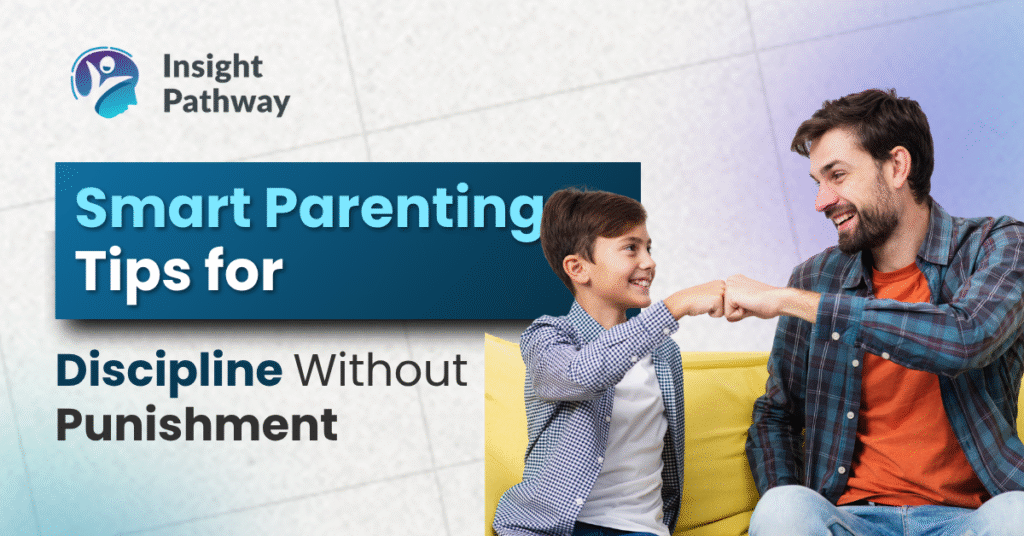While fostering a good family relationship, discipline without punishment is an empowering and respectful approach to lead youngsters toward excellent behavior. This method emphasizes teaching children self-discipline, empathy, and responsibility by compassion and understanding rather than depending on severe penalties as yelling, scolding, or time-outs. These clever parenting ideas for discipline without punishment can enable you to establish a calmer, happier household and raise confident, respectful children and lower family tension.

Why Discipline without Punishment Counts?
Although conventional approaches of discipline sometimes depend on punishment to address behavior, these can lead to emotional damage, resentment, and erasure of confidence between parent and kid. Unlike merely punishing “bad” conduct, discipline without punishment stresses teaching youngsters why rules matter and how their actions affect others.
This method fits very nicely with advice on positive parenting that include open communication, reward of good conduct, and explicit but reasonable limits setting. It also supports good parenting ideas, in which parents treat their children as competent people instead of only expecting compliance and show empathy.
Children disciplined without punishment often display improved emotional control, greater self-esteem, and more robust ability to solve problems, according to studies. They learn to absorb values rather than behave out of avoidance or anxiety. Discipline without punishment ultimately fosters resilience and guides children toward responsible adulthood.
Smart Parenting Advice for Discipline Without Punishment
These useful and efficient ideas apply calm parenting methods and parenting without punishment ideas.
1. Create consistent, clear boundaries.
Children that know what is expected of them flourish. Establishing well defined guidelines and processes fosters safety. Children learn limits without feeling threatened or confused when you regularly enforce them with calmity and tolerance.
For instance, gently explain, “running inside the house can be dangerous,” instead than screaming “Stop running! Please stroll.” By means of gentle reminders, you can help your youngster link rules to respect and safety.
2. Emphasize strategies for positive parenting and support of good behavior.
Emphasizing the behaviors you wish to see can help you to discipline without punishment in one of the most successful approaches. Catch your child acting morally and especially commend them. Say, “I love how you shared your toys with your sister today,” instead of platitudes like “Good job!”
Positive reinforcement increases motivation, confidence, and helps kids to be more likely to repeat good behavior. This strategy turns the emphasis from errors to development, therefore transforming discipline from a punitive to a supporting tool.
3. Instruct in emotional awareness and control.
A major component of discipline without punishment is guiding your child toward constructive emotional management and understanding of their feelings. Help them to identify their emotions (“I see you’re feeling angry”) and offer deep breathing, counting to ten, or quiet space techniques for coping.
Model how to remain cool under pressure by using calm parenting strategies. Calm parents help their children to better control their emotions. This also helps to avoid punishment turning into a power struggle motivated by irritation.
4. Use validating listening to practice respectful parenting.
Respectful parenting is accepting your child’s feelings and thoughts as legitimate even while you are correcting misbehavior. Children who feel heard and understood are more likely to be cooperative and changeable.
“I understand that you’re upset because you want to keep playing, but it’s time to clean up now,” you can remark. Children’s emotional intelligence develops in response to this form of sympathetic communication, which also respects them.
5. Employ natural consequences. Rather of Penance
Let your child face the natural results of their behavior when safe and suitable, instead of enforcing senseless penalties. A child might feel cold outside if they refuse to wear a coat, for instance. This helps children to grasp cause and effect free from control.
Talk to your youngster about the results later: “It was freezing, wasn’t it? Remember to wear a coat to keep warm the next time.”
6. Solve Problems Collectively
When problems develop, let your youngster help to find answers. “What can we do next time to avoid this problem?” you might ask. “How do you think we might fix this?”
This method shows your child you trust their judgment and fosters critical thinking and accountability. It also deepens your bond by means of cooperation instead of power.
7. Act consistently and patiently.
Parenting without punishment calls for endurance and consistent work. Change won’t happen over night; some days will be more difficult than other. Over time, consistency in your approach and cool under pressure will inspire good conduct and help to create trust.
Remember, if you feel overwhelmed, it’s good to pause for yourself; self-care helps you to respond deliberately instead of reactively.
Typical Mistakes to Avoid While Using Discipline Without Punishment
-
Reacting in irritation or rage compromises good parenting and may sour your relationship.
-
Frequent rule changes often perplex children and erode limits.
-
Ignoring or discounting emotions: Emotions must be accepted if they are to be controlled.
-
Simplify and age-appropriate your explanations to prevent overwhelming your child.
Discipline Without Punishment: Developing Resilience
By emphasizing polite parenting and applying calm parenting strategies, you enable your child to grow resilient—that is, to be able to confidently overcome obstacles. Children come to see that mistakes are chances for development rather than grounds for guilt or punishment.
Encouragement of lifetime skills including empathy, self-control, and problem-solving by this kind of loving discipline prepares kids to manage future relationships and obligations favorably.
Final Thoughts
Discipline without punishment is about loving, respectful, and understanding guiding of children, not about being permissive or lacking authority. Applying these smart parenting ideas—setting boundaries gently, rewarding good behavior, teaching emotional awareness, and solving problems together—you will produce content, confident children who flourish emotionally and socially.
Start using these techniques right now if you’re ready to welcome parenting without punishment and lay a strong basis for the development of your child. Along with enhancing behavior, you will strengthen your relationship and establish a calm home where everyone feels valued.

